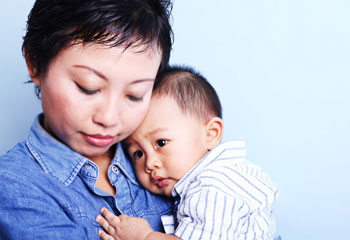Nikki, a self-proclaimed neat freak, could not motivate herself to do housework the last few months of pregnancy. Sarah, known for her cool, calm, and collected nature, had unusual worries and was very irritable the first months after her baby was born. Many might dismiss Nikki’s symptoms as laziness or sarah’s as overactive emotions. In reality, they are indicators of pre and postpartum adjustment reactions related to environmental stress and hormonal changes.
While not the most common topic of conversation, it is estimated that six to 20 percent of pregnant or new mothers experience some type of mental health symptoms. Many people are only familiar with postpartum disorders on either end of the spectrum – baby blues and postpartum psychosis. However, expectant or new moms can experience a wide range of mental health symptoms.
The baby blues are a mild, transient state caused by hormonal and biological changes the first week following childbirth. On the opposite end of the spectrum, postpartum psychosis is a rare, severe disorder that involves loss of contact with reality. In addition, most people are only familiar with the phrase postpartum depression while anxiety experienced pre partum – or before childbirth – is very common as well.
When a mother is irritable with the people she loves most, and feels overwhelmed, anxious, unmotivated, or just not herself for months, or even a year or more following childbirth and nursing, she is likely suffering from an undiagnosed adjustment reaction. Such reactions are caused by a combination of social stressors and biochemical factors, but can be treated with relative success. Professional interventions for recovery include education, counseling, and medication. Lifestyle changes that also help include increased sleep, adequate nutrition, delegation of domestic/child care tasks, and increased self-care and social support.
When pregnant women experience anxiety and depression symptoms for more than a few weeks, they should consult their obstetrician who can discuss safe and effective treatment options. It is equally important for fathers, partners, and other family members to learn about pre and postpartum mental health so they can recognize the signs and encourage mothers to seek treatment.
A mother should consult her health care provider if any of the following symptoms last more than a few weeks before or after childbirth:
• Tearfulness, hopelessness, sad, or depressed mood
• Feelings of guilt or worthlessness
• Worried, intrusive, or obsessive thoughts contrary to her values
• Panic attacks
• Compulsive behaviors
• Excessive hyperactivity or inability to sit still
• Racing thoughts, excessive talking
• Excessive fatigue, no motivation
• Increased or decreased appetite
• Mood swings, irritability, or aggressive behavior
• Insomnia (unable to sleep) or hypersomnia (excessive sleeping)
• Thoughts of harming the baby, self, or others
• Fear of being left alone with the baby
• Hyper vigilance about the baby’s well-being
• Auditory or visual hallucinations, paranoia (psychosis)
Looking ahead, there are risk factors that increase chances of anxiety and depression symptoms before or after childbirth, such as:
• Personal or family history of depression or anxiety and previous postpartum disorder
• Personal history of premenstrual mood syndrome (PMs) or premenstrual dysphoric disorder (PMDD)
• Personal history of thyroid imbalance or diabetes
Regarding lifestyle, factors that might contribute to an increased risk of pre and postpartum adjustment reaction include inadequate support in caring for the new baby, and financial, marital, or relational stress. Complications during pregnancy or birth, or difficulties with breastfeeding may raise a red flag for possible mental health adjustment issues. Women who are dealing with major recent life events – like a move, loss of a loved one, or changes in a work situation might struggle too. Furthermore, mothers of multiples, women who have undergone infertility treatments, and mothers whose infants are in the neonatal intensive care unit (NICU) should also be aware of an increased risk of pre and postpartum adjustment reaction.
 A woman’s mental health is as important as her physical health. While anxiety and depression symptoms related to pregnancy and postpartum can rarely be prevented, they can be successfully treated with professional help. Share this information with your loved ones who are expecting. The earlier treatment starts, the sooner we can all help nurture healthy mothers and families.
A woman’s mental health is as important as her physical health. While anxiety and depression symptoms related to pregnancy and postpartum can rarely be prevented, they can be successfully treated with professional help. Share this information with your loved ones who are expecting. The earlier treatment starts, the sooner we can all help nurture healthy mothers and families.







